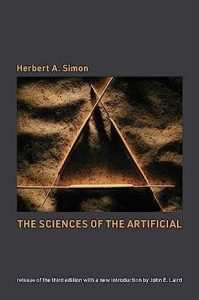This week I read Herbert Simon’s The Sciences of the Artificial, first published in 1969, and must confess to not knowing what to make of it. He contrasts ‘the artificial’ to ‘the natural’ but also more specifically applies it to complex systems designed to adapt to their environment, and compares arenas such as economics, management, and engineering systems. The point is then to analyse what properties they have in common, on the basis of information theory. The aim is evidently to present a common analysis of the various types of system considered. So far, so good. And as Professor Google tells me, the book was very influential in the design of computer systems and design theory more generally.
Beyond that? Well, I asked Bard, which said:
“The book argues that artificial systems can be studied scientifically, just like natural systems. Simon defines an artificial system as “a system that has been brought into being by human design.” He argues that artificial systems are not just imitations of natural systems, but are in fact a distinct class of systems with their own properties and laws.
Simon then goes on to discuss the various aspects of artificial systems that can be studied scientifically. He covers topics such as the design of algorithms, the nature of problem solving, and the role of heuristics in decision making. He also discusses the relationship between artificial systems and human intelligence.”
Very timely, then. But I’m hard pushed to summarise what the conclusions are, and allergic to the strong positivism of it. As readers of Cogs and Monsters will know, I think economic systems differ from engineering systems in important ways, and are not amenable to exactly the same kind of ‘scientific’ analysis. The ‘sciences of the artificial’ seem like they do well in analysis of algorithmic systems, but not so much – contrary to the claim in the book – for education, art and architecture, or indeed economics.


I read /Sciences of the Artificial/ a million years ago when I was a computer science student in college. My main takeaway was that human organization – hierarchies in particular – are artificial. Before that, I just assumed that’s the way things were, as if created by some natural law that couldn’t be changed. Of course hierarchies are an emergent creation of humans and other animals, so there is some nature to it, but the details matter, and the details are artificial. This opened up a whole world to me where businesses didn’t have to be constructed around an authoritative centralized hierarchy.